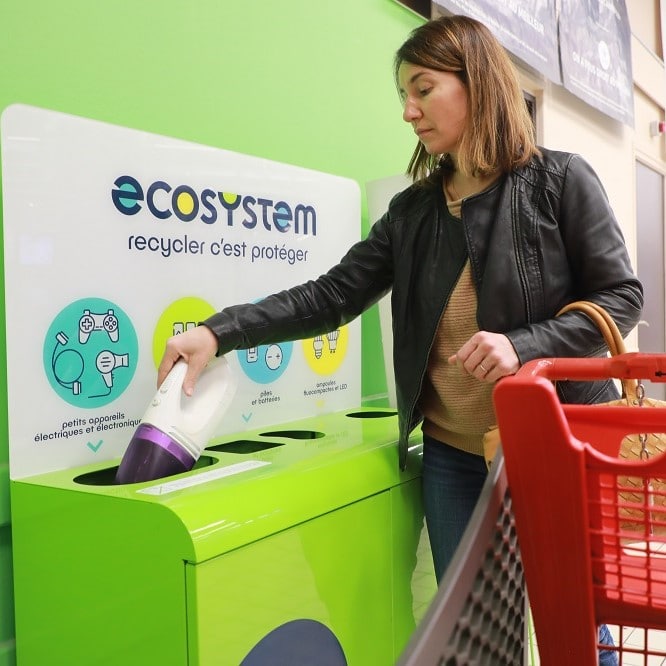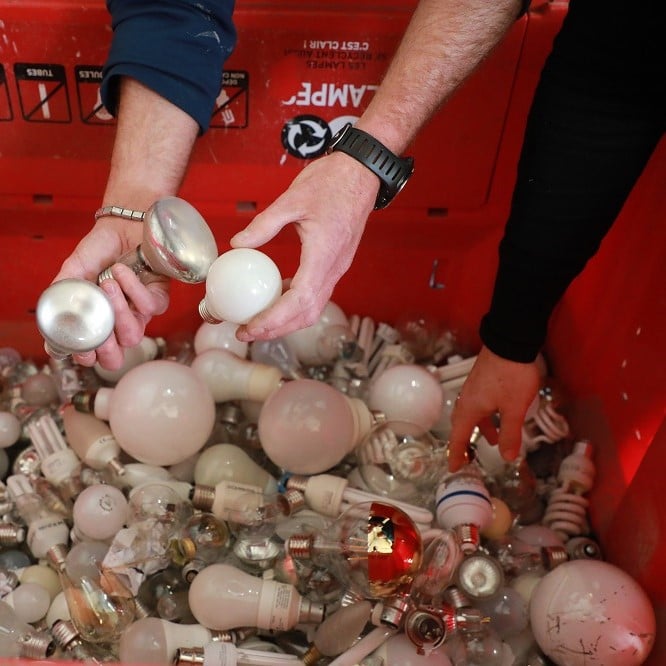 Eco-design initiatives
Eco-design initiatives
Assisting in end-of-service life eco-design
We provide assistance to producers in the eco-design of their projects and help them to improve and better design the equipment that they manufacture in order to ensure a more environment-friendly end-of-service life.
Supporting the integration of recycled plastics
Eco-designing a product consists in manufacturing it by taking into account the environmental impact of all the stages in its life cycle. ecosystem assists its partners with a range of end-of-service life issues, in order to anticipate right from the beginning the choices that foster quality recycling as well as a more virtuous approach to the environment.
Providing tools
The Life Cycle Inventory (LCI) database was developed to model environmental impacts in the manufacturing of 3 recycled plastics (polypropylene - PP, polystyrene -PS and acrymonitrile butadiene styrene - ABS) resulting from WEEE recycling. For this development, we worked closely with the main European plastics regeneration operators for plastics coming from collected WEEE in France. This information, cost-free and freely accessible, will allow producers to promote the environmental benefits of using recycled plastics by comparing the use of other materials. This work was presented at the Electronic Goes Green Congress, held virtually at the beginning of September 2020.
Standards
Works on standards continued in 2020.
- Standards EN 45555 and 45557
Two European standards (CEN-CENELEC) co-managed by ecosystem on evaluating the recyclability and the recovery potential of products, as well as their evaluation of recycled materials content in appliances, were finalised and formally approved They set the general framework and will be rolled out into standards. For information, the set standards worked on during this mandate (M543: Material efficiency) were approved.
- Standard EN50693
This standard that lays down the common rules for carrying out the life cycle analysis of electrical and electronic products and the framework for environmental reporting, was finalised and approved. ecosystem was able to contribute to its development in regards to end-of-service life in a product’s global analysis.
Urban Mines Chair
Works on standards continued in 2020.
- Plastics workshop
We had the opportunity to exchange with universities, EEE manufacturing industrials, plastics recycling and regeneration industrials about new sorting technologies (monitoring, synthetics, exploratory) and about the ways in which to foster exchange between recycled plastics recycling/regenerators and potential users (manufacturers/plastics industry). One of the outcomes of this workshop was the need to continue our work on a quality document for recycled plastics.
- Eco-design in the era of the circular economy workshop
This brainstorming cycle was initiated with MinesParisTech in order to discuss best practices between professionals based on the latest developments discussed in academic studies and producer testimonies. Two workshops were held in 2020: “How to promote eco-design with clients”, and a second one on the topic of “Repairability, sustainability, a new horizon for eco-design”, with both sparking off a wealth of exchange in a multi-disciplinary approach.
Partnership with the ISIGE and other training courses
The partnership between ecosystem and ISIGE (Institut Supérieur d’Ingénierie et de Gestion de l’Environnement de l’école Mines ParisTech) is continuing for a third year. Students from the 2020-2021 cohort were able to further study the technical, economic and environmental challenges related to prolonging the service life of electrical equipment, with the input of multidisciplinary lectures and expert interview session.
We also had the opportunity to find out about the issues in recycling or end-of-service life eco-design through lectures in order to raise student awareness in recycling at ParisTech Chair’s member schools as well as in other engineering schools, such as ChimieParisTech, MinesParisTech, AgroParisTech the European Athens programme, ECAM and the Université de Technologie de Compiègne.




